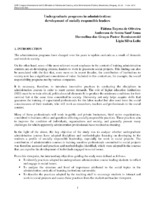Undergraduate programs in administration: development of socially responsible leaders

View/
Date
2013Author
Oliveira, Fátima Bayma de
Romiszowski, Hermelina das Graças Pastor
Leite, Ligia Silvia
Sant'Anna, Anderson de Souza
Metadata
Show full item recordAbstract
The purpose of this article is to analyze whether the undergraduate administration courses have adopted disciplines and methodologies focusing on developing in the students a socially responsible leadership profile, especially for working in social projects. As a theoretical review, the profile and skills of socially responsible leaders were addressed. Administration training in Brazil was discussed next, with regard to inclusion of disciplines and methodologies associated with corporate social responsibility and social projects in the undergraduate courses. The benchmark finishes with a discussion on the assessment process of the administration course in Brazil. In methodological terms, the study may be characterized as qualitative-quantitative, using in-depth interviews as collection tools, with sixteen (16) teachers from administration courses in several Brazilian learning institutions and 130 questionnaires applied to the students in their last term of the course. The result was that adopting disciplines and methodologies focusing on the development in the students of a socially responsible leadership profile is still in the early stages in Brazilian higher education institutions. Since the valorization of these topics, namely social responsibility, social projects and third sector, is relatively recent, it is understandable that the reflections of this trend in administration courses should only occur in the next few decades. It was also found that the disciplines addressing social issues are not yet part of the compulsory curriculum of the administration course.

